
Microsoft pushed throughout 2023 to add generative AI capabilities to its software, even extending its new Copilot AI assistant to Windows 10 late last year. Now, those efforts to transform PCs at a software level is extending to the hardware: Microsoft is adding a dedicated Copilot key to PC keyboards, adjusting the standard Windows keyboard layout for the first time since the Windows key first appeared on its Natural Keyboard in 1994.
The Copilot key will, predictably, open up the Copilot generative AI assistant within Windows 10 and Windows 11. On an up-to-date Windows PC with Copilot enabled, you can currently do the same thing by pressing Windows + C. For PCs without Copilot enabled, including those that aren't signed into Microsoft accounts, the Copilot key will open Windows Search instead (though this is sort of redundant, since pressing the Windows key and then typing directly into the Start menu also activates the Search function).
A quick Microsoft demo video shows the Copilot key in between the cluster of arrow keys and the right Alt button, a place where many keyboards usually put a menu button, a right Ctrl key, another Windows key, or something similar. The exact positioning, and the key being replaced, may vary depending on the size and layout of the keyboard.
We asked Microsoft if a Copilot key would be required on OEM PCs going forward; the company told us that the key isn't mandatory now, but that it expects Copilot keys to be required on Windows 11 keyboards "over time." Microsoft often imposes some additional hardware requirements on major PC makers that sell Windows on their devices, beyond what is strictly necessary to run Windows itself.
If nothing else, this new key is a sign of how much Microsoft wants people to use Copilot and its other generative AI products. Plenty of past company initiatives—Bing, Edge, Cortana, and the Microsoft Store, to name a few—never managed to become baked into the hardware like this. In the Windows 8 epoch, Microsoft required OEMs to build a Windows button into the display bezel of devices with touchscreens, but that requirement eventually disappeared. If Copilot fizzles or is deemphasized the way Cortana was, the Copilot key could become a way to quickly date a Windows PC from the mid-2020s, the way that changes to the Windows logo date keyboards from earlier eras.
We'll definitely see more AI features from Microsoft this year, too—Microsoft Chief Marketing Officer Yusuf Medhi called 2024 "the year of the AI PC" in today's announcement.
Chipmakers like Intel, AMD, and Qualcomm are all building neural processing units (NPUs) into their latest silicon, and we'll likely see more updates for Windows apps and features that can take advantage of this new on-device processing capability. Rumors also indicate that we could see a "Windows 12" release as soon as this year; while Windows 11 has mostly had AI features stacked on top of it, a new OS could launch with AI features more deeply integrated into the UI and apps, as well as additional hardware requirements for some features.
Microsoft says the Copilot key will debut in some PCs that will be announced at the Consumer Electronics Show this month. Surface devices with the revised keyboard layout are "upcoming."
reader comments
394